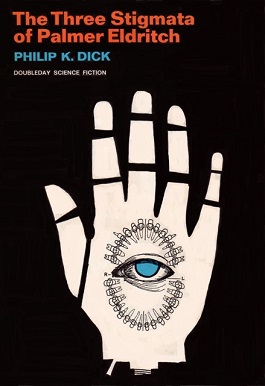
The Three Stigmata of Palmer Eldritch is a 1964 science fiction novel by American writer Philip K. Dick. It was nominated for the Nebula Award for Best Novel in 1965. Like many of Dick's novels, it utilizes an array of science fiction concepts and explores the ambiguous slippage between reality and unreality. It is one of Dick's first works to explore religious themes.

Do Androids Dream of Electric Sheep? is a 1968 dystopian science fiction novel by American writer Philip K. Dick. It is set in a post-apocalyptic San Francisco, where Earth's life has been greatly damaged by a nuclear global war, leaving most animal species endangered or extinct. The main plot follows Rick Deckard, a bounty hunter who has to "retire" six escaped Nexus-6 model androids, while a secondary plot follows John Isidore, a man of sub-par IQ who aids the fugitive androids.

The Time Ships is a 1995 hard science fiction novel by Stephen Baxter. A canonical sequel to the 1895 novella The Time Machine by H. G. Wells, it was officially authorized by the Wells estate to mark the centenary of the original's publication. The Time Ships won critical acclaim. It won the John W. Campbell Memorial Award and the Philip K. Dick Award in 1996, as well as the British Science Fiction Association Award in 1995. It was also nominated for the Hugo, Clarke and Locus Awards in 1996.
Postmodern literature is a form of literature that is characterized by the use of metafiction, unreliable narration, self-reflexivity, intertextuality, and which often thematizes both historical and political issues. This style of experimental literature emerged strongly in the United States in the 1960s through the writings of authors such as Kurt Vonnegut, Thomas Pynchon, William Gaddis, Philip K. Dick, Kathy Acker, and John Barth. Postmodernists often challenge authorities, which has been seen as a symptom of the fact that this style of literature first emerged in the context of political tendencies in the 1960s. This inspiration is, among other things, seen through how postmodern literature is highly self-reflexive about the political issues it speaks to.
The Owl in Daylight is a novel Philip K. Dick was writing at the time of his death in 1982. He had already been paid an advance for the book by the publisher and was working against a deadline. After his death, his estate approached other writers about the possibility of someone completing the novel based on his notes, but that proved to be impossible, as he had never formally outlined the story. Dick viewed the novel as his Finnegans Wake. The idea was inspired partly by an entry in the Encyclopædia Britannica on Beethoven that referred to him as the most creative genius of all time, partly by traditional views of what constitutes the human heaven, and finally by the Faust story.
Radell Faraday Nelson was an American science fiction author and cartoonist most notable for his 1963 short story "Eight O'Clock in the Morning", which was later used by John Carpenter as the basis for his 1988 film They Live.
"The Last of the Masters" is a science fiction novelette by American writer Philip K. Dick. The original manuscript of the story was received by the Scott Meredith Literary Agency on July 15, 1953, and the story was published by the Hanro Corporation in the final issue of Orbit Science Fiction in 1954. It has since been reprinted in several Philip K. Dick story collections, beginning with The Golden Man in 1980.

"The Crawlers" is a science fiction short story by American writer Philip K. Dick. Submitted under the title "Foundling Home", it was first published as "The Crawlers" in Imagination magazine, July 1954.
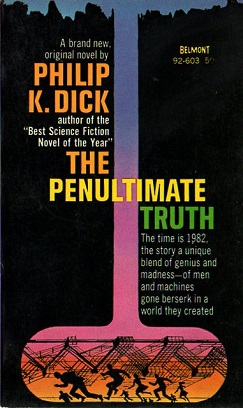
The Penultimate Truth is a 1964 science fiction novel by American writer Philip K. Dick. The story is set in a future where the bulk of humanity is kept in large underground shelters. The people are told that World War III is being fought above them, when in reality the war ended years ago. The novel is based on Dick's 1953 short story "The Defenders". Dick also drew upon two of his other short stories for the plot of the novel: "The Mold of Yancy" and "The Unreconstructed M".
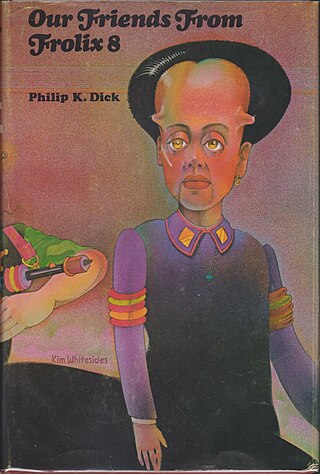
Our Friends from Frolix 8 is a 1970 science fiction novel by American writer Philip K. Dick. The novel is set in the 22nd century, where humanity is ruled by mutated humans, "New Men" and "Unusuals", while normal "Old Men" are discriminated against. The story follows Nick Appleton, a low-class worker who falls in love with a subversive agent, while Thors Provoni has gone deep into space to find an ally to the resistance.

The Game-Players of Titan is a 1963 science fiction novel by American writer Philip K. Dick.
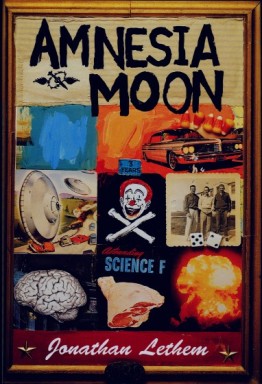
Amnesia Moon is a 1995 novel by Jonathan Lethem. Lethem adapted the novel from several unpublished short stories he had written, all about catastrophic, apocalyptic events. When Tor Books published the second edition in 1996, they commissioned Michael Koelsch to illustrate a new cover art; Koelsch had previously illustrated Lethem's previous book cover art Gun, with Occasional Music.
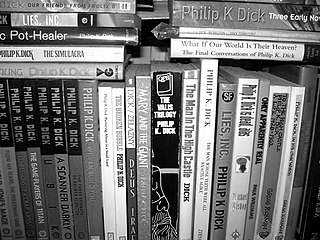
The bibliography of Philip K. Dick includes 44 novels, 121 short stories, and 14 short story collections published by American science fiction author Philip K. Dick during his lifetime.

The Body Snatchers is a science fiction horror novel by American writer Jack Finney, originally serialized in Collier's magazine in November–December 1954 and published in book form the following year.

"Colony" is a science fiction short story by American writer Philip K. Dick. It was first published in Galaxy magazine, June 1953. The plot centers on an expedition to an uncharted planet, on which the dominant, predatory alien life form is capable of precise mimicry of all kinds of objects. The size and complexity of the mimicked object can vary from simple doormats to whole spaceships with the larger objects usually attempting to trap and "absorb" humans similar to carnivorous plants.
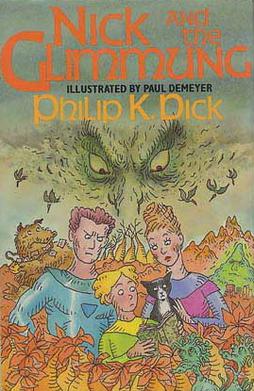
Nick and the Glimmung is a children's science fiction novel written by American author Philip K. Dick in 1966. It was first published by Gollancz in 1988. It is set on "Plowman's Planet", in the same continuity as his adult science fiction novel Galactic Pot-Healer.
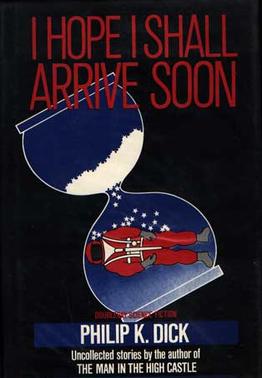
I Hope I Shall Arrive Soon is a book by American writer Philip K. Dick, a collection of 10 science fiction short stories and one essay. It was first published by Doubleday in 1985 and was edited by Mark Hurst and Paul Williams. Many of the stories had originally appeared in the magazines Fantasy and Science Fiction, Worlds of Tomorrow, Amazing Stories, Interzone, Rolling Stone College Papers, The Yuba City High Times, Omni and Playboy.

The Collected Stories of Philip K. Dick is a collection of 118 science fiction stories by American writer Philip K. Dick. It was first published by Underwood-Miller in 1987 as a five volume set. See Philip K. Dick bibliography for information about the mass market reprints.
Postmodern Metanarratives: Blade Runner and Literature in the Age of Image is a non-fiction book by Décio Torres Cruz published in 2014 by Palgrave Macmillan.













